India. The life of the tea pickers.
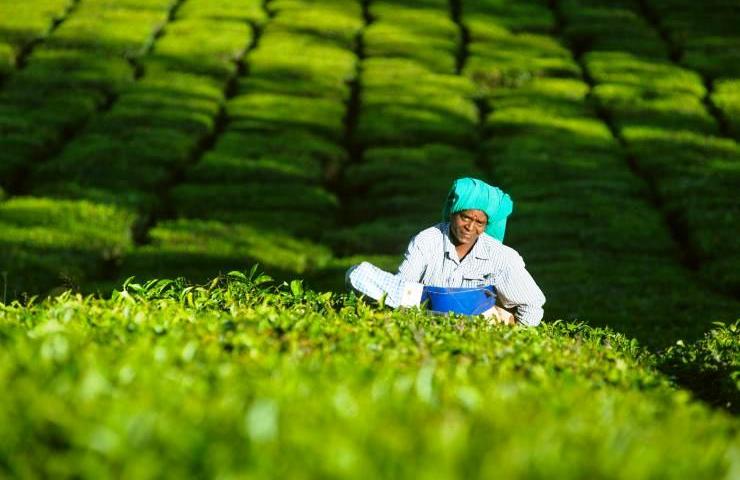
Grasping the fresh, light green shoots in her hand, she separates them from the plants and tosses them into the cloth bag tied with a band around her forehead. A gesture that the women of Darjeeling will repeat thousands of times. A life made of sacrifices and suffering.
But the Salesian schools try to give hope to the children
of many tea pickers.
When the siren sounds breaking the silence, the morning fog has already disappeared. Piyari had already prepared breakfast for her children in the dark except for the light of a small lamp. Like every other day, she got up before the others from the bed where the family sleeps together. She fetched water and boiled it on a small wood stove. While her family were still asleep, she swept the yard in front of the cabin, fed the rabbits and washed the clothes. The siren sounded at seven. Time to go to work.
Half an hour earlier the women of the village emerged from their huts and headed towards their work: an endless field of the intense green of the tea that flourishes here. The bushes reach up to the women’s waists while they seem to turn round this way and that almost automatically for hours and hours. They choose and fold the leaves, again and again. Each leaf has “two leaves and a bud,” just as British colonial rulers intended 150 years ago. Piyari stoops, taking the fresh, light green shoot in her hand, separates it from the plant and tosses it into the cloth tied with a ribbon on her forehead. At noon you will have a break of one hour for lunch. It’s not worth going home.
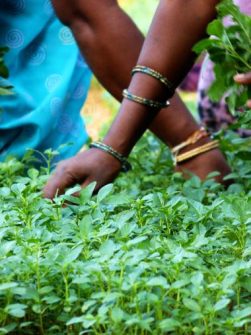
The same gesture over and over again. 123rf
And then she starts again. The same gesture over and over again. Until the heavy sack on her back is filled for the second time that day. It must weigh at least 18 kilograms. To do this she must have stooped over thousands of times. And she will receive a payment of 230 rupees, the equivalent of 2.57 euros. Translated into one kilogram, this is 1.4% of the price for which the precious tea will eventually be sold in Europe.The English used to wonder if the tea from their Indian colony would ever become a viable business. At the time, the noble drink, long reserved for the upper classes, came mainly from China and was subject to a monopoly. To break it, the English even took up arms in the mid-19th century and launched the Opium Wars. They later smuggled tea seeds across the border from China and began experimenting with growing them themselves.
North of their then capital, Calcutta, in the foothills of the Himalayas, conditions seemed ideal for this since tea requires the right combination of enough sunshine, plenty of rain and temperatures between 18 and a maximum of 30 degrees.
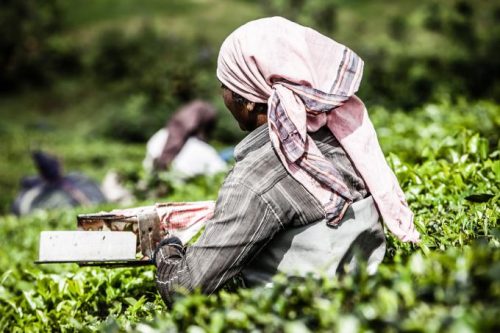
Woman picking tea leaves in a tea plantation. 123rf
When the siren sounds again, it is 5 pm and Piyari and her companions drag themselves with their full bags to the collection point where they empty and weigh them. Supervisors note whether each of the women has reached the 40-pound goal. When Piyari returns home it is already dusk. By the light of a candle she prays with her family, she looks at the images of Mary, Joseph and the baby Jesus and thanks the Lord for the day. Like all the villagers, Piyari’s family belongs to an Indian ethnic minority, many of whom are Catholic. After preparing food for dinner, Piyari chats with her husband for a while before going to bed. He works in a nearby factory. There, the tea leaves are left to wither immediately after harvesting, then rolled and fermented, turning green tea into black tea. This is then followed by sieving, drying and packaging. Then, without delay, it is sent abroad.
India is a major tea power and, after China, the largest producer in the world. Tea, and not coffee, is the most consumed drink globally. Tea is a most lucrative business but a business that leaves little for those who collect it, at least for Piyari and the half-million or so people who toil in tea cultivation in the Indian state of West Bengal. Their wages are low by Indian standards, where, according to studies, pickers’ earnings are the lowest of all occupational groups.
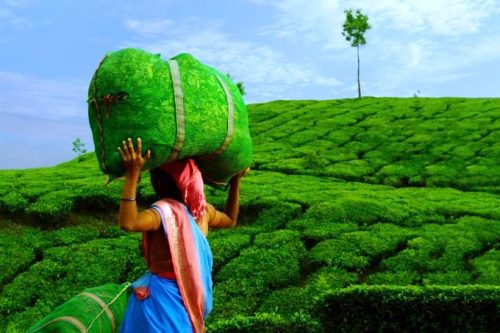
Worker carrying tea leaves in bag at tea plantation. 123rf
Just how bitter is the taste of this fine drink becomes evident as you make your way up a path to the “champagne of tea”, Darjeeling. While Piyari and others work lower down, in an area tea connoisseurs will call Dooars, the picture now changes with terraces perched as high as 2,000 meters above sea level. The only road ascends steeply. Like a soft, green carpet, tea covers the intermediate slopes.
Darjeeling tea is regarded by connoisseurs as the most delicious in the world. Fine in aroma, in the earliest harvest, the legendary “first flush”, “delicate and floral”. Later, when new leaves and shoots appear and the monsoon does its work, it is “strong,” “bitterly nutty,” and “copper-coloured in the cup,” just as connoisseurs of fine wines would say. Only one thing remains the same about Piyari and those who work below: their wages and their suffering.
“It’s a job that slowly wears you out. I have seen it with my mother over the years,” says Nikita, a young 19-year-old student. Like Piyari, her mother will not utter a word of complaint. Many young people are trying to get out so that fate does not repeat itself. And it is their parents who want nothing more than their success. “Otherwise, you get trapped like a frog in a well, as they say in India,” says Father José, a Salesian priest and rector of a nearby school. The Salesian is very concerned at the plight of the pickers. And he continues: “They are exploited and paid starvation wages. Although they work harder than almost anyone else, they live in poor huts, rarely have electricity and often don’t even have a bathroom. And so it is for generations.”
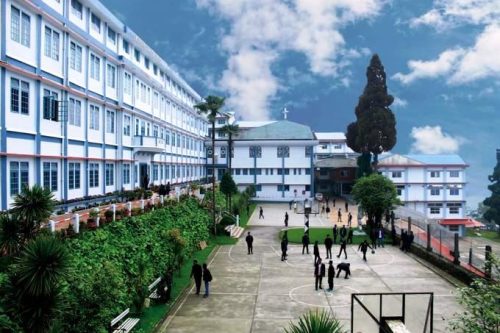
The Salesian school in Sonada. Photo ANS
Nikita attends the Salesian school in Sonada, the last town before Darjeeling. She confesses: “For me, going there was as real as a trip to the moon. Something far away, unimaginable. Such a good reputation, and such a fantastic lineup. How could my parents, who both work on plantations, afford such a thing?” The girl’s path therefore seemed predetermined. Only a few years of public school: reading, writing, a little arithmetic, nothing more. And then, if you’re lucky, you get your mother’s contract with the tea plantation, signed for life. A life already sealed before it even begins.
Thanks to scholarships from the Salesians, Nikita and other friends attend the Salesian school. The young girl dreams of a career far away from exploitation. The fact that something like this is possible was inspired by Father Jose: “Our colleges should be among the best in the Western Himalayas. We pay teachers good salaries, we hire high-calibre people, and we can afford to charge high college fees. The children of the plantation owners come to us. And the children of their collectors also come to us. Through school fees, we can sponsor many students who would otherwise not have a chance in life.”
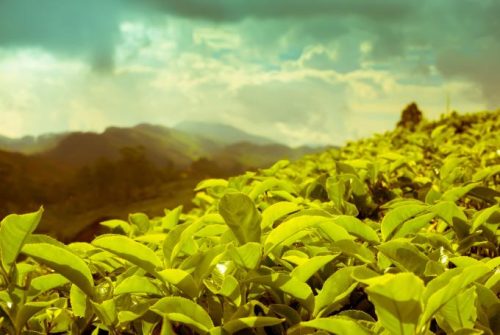
Landscape of tea plantations.123rf
Away from Sonada lies one of Darjeeling’s 84 tea terraces. Its inhabitants, including those with Nepalese ancestry, are almost all Catholic and have gathered in church to pray. They joyfully welcome Father Tomy, another Salesian into the wooden building. They later praise him for their children, who are making such great progress. They also owe it to Stella and Ronit, students of the Salesian school and children of tea pickers from Darjeeling who regularly make the long journey to the village. “To give something back,” as they say, “because with our scholarships we have been given an incalculable opportunity. We will receive free training that will open completely new doors for us. So, we come here to tutor the children because we know how little they learn in state schools.” The Salesians urge young students to “Grow yourself but don’t leave others behind on your path. Learn on your own and do something for your community. You may go away but never forget Darjeeling when you sip a cup of expensive tea in Kolkata, Delhi or wherever. Because only you know what’s inside your cup.” (Open Photo: Tea picker woman collect leaves at plantation. 123rf)
Christoph Lehermayr/allewelt



